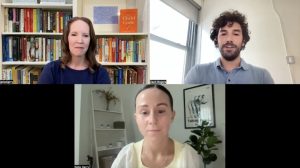
In recent years, the impact of alcohol on women’s health has become a growing concern. Studies show that women are consuming alcohol at rates comparable to men, leading to an increase in alcohol-related health issues among women. As Dr. Kobb, the Director of the National Institute on Alcohol Abuse and Alcoholism (NIAAA) recently stated, “Alcohol is a growing women’s health issue. The rapid increase in deaths involving alcohol among women is troubling and parallels the increases in alcohol consumption among women over the past few decades.”
With these alarming trends in mind, Monument was thrilled to welcome Katie Garry (CEO & Founder of Seek) and Dr. Danielle Dick, Ph.D (Director, Rutgers Addiction Research Center + Seek Science Advisor) to spotlight this issue and share the amazing product Seek has built to help women better understand how alcohol affects them and make healthier choices.
Below is a quick summary of the key areas we discussed. Watch the recording, and check out seekhealthtest.com for more information!
Katie’s Experience and Her Vision for Seek: Katie shared her personal experiences with alcohol and health, which led her to create Seek. She observed a significant gap in resources for women who want to understand the health impacts of alcohol without completely abstaining. Her journey began with health issues that prompted her to investigate how alcohol was affecting her body, despite maintaining other healthy lifestyle habits. Katie’s vision for Seek is to provide women with the necessary tools to understand how alcohol affects their health. Seek offers at-home lab tests that measure various biomarkers sensitive to alcohol consumption. This initiative aims to empower women with knowledge, enabling them to make informed decisions about their drinking habits.
Trends in Women’s Drinking Patterns: Katie highlighted troubling trends, such as the increasing rates of alcohol-related deaths and health issues among women. Dr. Danielle Dick added that research shows women metabolize alcohol differently than men, leading to higher susceptibility to conditions like liver disease and breast cancer. This trend is compounded by social changes and increasing alcohol consumption among women.
The Role of Science and Personalized Insights: Seek utilizes scientific research to measure biomarkers across several health categories, such as heart, brain, liver, fertility, menopause, gut microbiome, and skin. This scientific approach provides women with personalized insights into how alcohol affects their bodies, encouraging preventive health measures.
Genetics and Alcohol Metabolism: Dr. Danielle Dick elaborated on how genetics significantly influence alcohol metabolism and susceptibility to addiction. She explained that genetic variations affect how our bodies process alcohol, including differences in liver enzymes responsible for breaking down alcohol. Some individuals have genetic variations that make them metabolize alcohol more slowly, leading to higher levels of alcohol in the bloodstream and greater risk of health problems. Additionally, genetics can influence brain responses to alcohol, impacting how rewarding or aversive alcohol consumption feels.
Family Dynamics and Drinking Habits: Family dynamics are crucial in shaping one’s drinking habits. Dr. Dick emphasized the importance of parents, especially moms, modeling healthy drinking behaviors and having open conversations with their children about alcohol. She provided strategies for discussing alcohol with children in an age-appropriate manner, highlighting the importance of transparency.
Future Vision for Seek: Katie envisions Seek expanding its preventive testing and offering a comprehensive range of resources to support women’s mindful drinking and larger health goals. This includes partnerships for non-alcoholic drink discounts, lifestyle resources like virtual workouts and meditation classes, and nutritional supplements. The goal is to provide a holistic approach to help women achieve their health and mindful drinking objectives. Advancing research on how alcohol impacts the female body is also a huge focus for Seek, which their team of clinicians and scientists are just starting to tap into.
